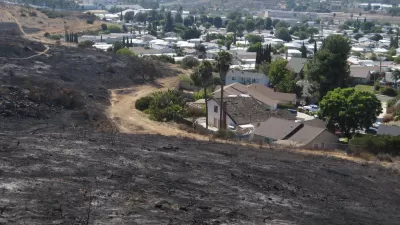Local governments and utilities are overexposed and underinsured relative to an increasing threat from severe weather events. The Brookings Institution has released a report on a new funding tool to help meet these challenges.
"One way for cash-strapped local governments to increase both protection and insurance against disasters is through a new financial tool called resilience bonds," according to a post by Shalini Vajhala.
Vajhala and colleague James Rhodes recently produced a report titled "Leveraging Catastrophe Bonds as a Mechanism for Resilient Infrastructure Project Finance" [pdf]. The idea behind the report "is to link insurance coverage that public sector entities can already purchase (such as catastrophe bonds) with capital investments in resilient infrastructure systems (such as flood barriers and green infrastructure) that reduce expected losses from disasters." Both the report and the article compare the connection between infrastructure and insurance with healthcare. Having life insurance or health insurance doesn't make people healthier, just like catastrophe bonds don't reduce physical risks.
"Resilience bonds," according to Vajhala, "combine these two different types of investments by modifying traditional catastrophe bonds to provide insurance savings that can be captured as rebates to invest in resilient infrastructure projects." The article includes more detail on why cities should be paying attention to resilience bonds.
FULL STORY: Financing infrastructure through resilience bonds

Planetizen Federal Action Tracker
A weekly monitor of how Trump’s orders and actions are impacting planners and planning in America.

San Francisco's School District Spent $105M To Build Affordable Housing for Teachers — And That's Just the Beginning
SFUSD joins a growing list of school districts using their land holdings to address housing affordability challenges faced by their own employees.

The Tiny, Adorable $7,000 Car Turning Japan Onto EVs
The single seat Mibot charges from a regular plug as quickly as an iPad, and is about half the price of an average EV.

Seattle's Plan for Adopting Driverless Cars
Equity, safety, accessibility and affordability are front of mind as the city prepares for robotaxis and other autonomous vehicles.

As Trump Phases Out FEMA, Is It Time to Flee the Floodplains?
With less federal funding available for disaster relief efforts, the need to relocate at-risk communities is more urgent than ever.

With Protected Lanes, 460% More People Commute by Bike
For those needing more ammo, more data proving what we already knew is here.
Urban Design for Planners 1: Software Tools
This six-course series explores essential urban design concepts using open source software and equips planners with the tools they need to participate fully in the urban design process.
Planning for Universal Design
Learn the tools for implementing Universal Design in planning regulations.
Smith Gee Studio
City of Charlotte
City of Camden Redevelopment Agency
City of Astoria
Transportation Research & Education Center (TREC) at Portland State University
US High Speed Rail Association
City of Camden Redevelopment Agency
Municipality of Princeton (NJ)




























